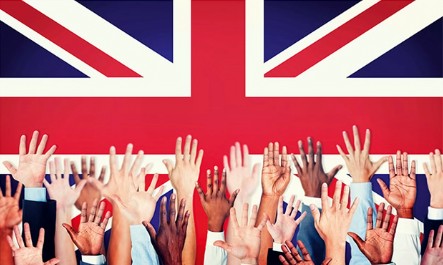aNewDomain — It’s official. The United Kingdom has voted to leave the European Union.
A founding member of the EU, Britain will be the first country ever to leave it.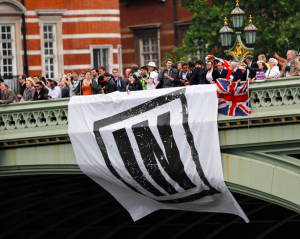
The results of the historic referendum were certified early Friday morning in London. Four hours later, UK Prime Minister David Cameron announced his resignation. He will leave No. 10 Downing Street in October after the Conservative Party meeting concludes.
The economic repercussions of the decision became evident early, even as the votes were still being counted. By the time official results were announced, the British pound had dropped fully 10 percent. It is now at its lowest point since 1984.
Bank of England officials announced a state of economic emergency six hours after the Brexit news was out.
After the Brexit decision, Scotland and Northern Ireland separationists said they are now planning voter referendums to break off from the UK. Britain, quite literally, may be falling apart at the seams.
The Brexit decision is the most profound political change the UK has seen in a generation, according to historians.
Its political fallout is expected to mount in the hours and days that follow. As right-wing anti-EU forces proclaiming independence move into power, UK Labour leader Jeremy Corbyn will likely become the prominent British politician to take the fall. He is expected to resign under pressure, according to press reports. Odds are he won’t be the last.
But it is the EU itself that could well end up Brexit’s biggest victim. After the Brexit vote was announced Friday morning in Europe, Geert Wilders, the leader of Holland’s bitter anti-immigration movement, renewed calls for a similar Dutch referendum, known as “Nexit.” Euroskeptics in Denmark and Sweden are expected to demand similar referendums in short order, too.
Ironically, the only major power that seems capable of saving Europe is the same one that tried to destroy it 75 years ago. As a result of Brexit, Germany is now Europe’s preeminent power.
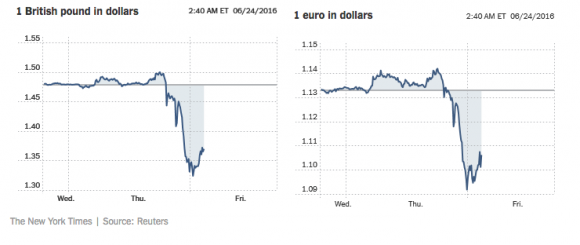 The Brexit debate has at once electrified and divided the British populace. When journalists asked them if they understood the potentially dire economic consequences of such a decision, supporters seem undeterred, according to media reports. They were determined to “gain independence” and “send a message” to Britain’s privileged class, as UKip leader and Brexit proponent Nigel Farage put it.
The Brexit debate has at once electrified and divided the British populace. When journalists asked them if they understood the potentially dire economic consequences of such a decision, supporters seem undeterred, according to media reports. They were determined to “gain independence” and “send a message” to Britain’s privileged class, as UKip leader and Brexit proponent Nigel Farage put it.
Outrage and anger have reportedly fueled Britain’s Brexit movement most. Polls show such supporters to be predominantly older, rural or blue collar residents of outlying English small cities and town, as well as Wales. The British media has often compared such supporters to the frustrated and disenfranchised Americans who support presumptive Republican Party nominee Donald J. Trump’s bid for US president.
Seven days ago, Brexit anger claimed its first life, that of British Parliament member Jo Cox. Thomas Mair stabbed and fatally shot Cox, witnesses allege, while shouting out Brexit slogans that demanded “British independence.”
The question of exiting the EU has been debated for years in political circles, it only came to the forefront in February, when Cameron first announced the referendum.
 Voters in London, Scotland, and Northern Ireland Voted Overwhelmingly To Stay. Older, rural and working class voters wanted out …
Voters in London, Scotland, and Northern Ireland Voted Overwhelmingly To Stay. Older, rural and working class voters wanted out …
The referendum was one of the largest turnouts in British history. More than 72 percent of the Brits voted in the election, according to British election officials.
Exit polls and polls conducted over the last few days signaled that a decision to remain in the EU would win, though by a narrow margin. The exit polls suggested voters would decide to remain in the EU by a narrow margin, with 52 percent in favor. The actual result was the opposite: 48 percent voted to remain in the EU, while 52 percent voted to leave.
The Brexit vote has revealed intense division among UK citizens along class, economic and regional lines.
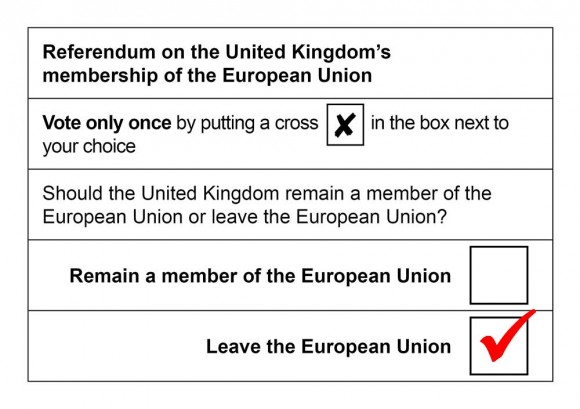
Asked to stay and hold the UK together after the vote, Cameron says he is out of there.
Cameron was widely expected to resign as a result of the vote and did so. Former London mayor Boris Johnson, who championed the anti-EU Brexit push, is the politician many expect to take his place.
Cameron and Johnson, both of the ruling Conservative Party, fought on opposite sides of the Brexit struggle.
Hillary Benn, of the Labour Party, and Ukip leader Farage were among several high-profile Brexit proponents who publicly said earlier this week that, if Brexit won, Cameron should go.
“I think it’s very hard for him in those circumstances to remain. If you are the Prime Minister and you’ve called this referendum, you’ve laid your reputation on the line, Benn told the UK Telegraph on Wednesday. It’s “going to be very hard” for Cameron to lead in such circumstances, she said
Some 80 members of Cameron’s Conservative Party signed a letter that says he has “a mandate and a duty” to stay, if only to keep things calm in the transition period, but to no avail.
Pressure is also mounting for the resignations of Labour Party leader Corbyn and other politicians who were against the movement.
Out with the EU … and out with Scotland and Northern Ireland, too?
Scottish National Party officials have repeatedly insisted that the UK’s departure from the EU would trigger another Scottish independence vote.
The Sinn Fein party in Northern Ireland is also reportedly planning a referendum on rejoining Northern Ireland to the Irish Republic.
Members of Britain’s Conservative Party especially have complained for years about the EU’s stultifying bureaucracy and its regulation-happy leaders.
Yesterday’s election was the first time in 41 years that anyone has asked UK citizens to weigh in on EU membership.
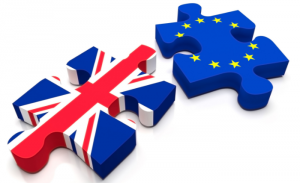 Britain joined the European Communities (EC), also known as the Common Market, in 1973.
Britain joined the European Communities (EC), also known as the Common Market, in 1973.
Two years later, British citizens voted 67 percent in favor of staying in the organization. Labour Prime Minister Harold Wilson and future Conservative Prime Minister Margaret Thatcher were big supporters of the idea at the time. In 1993, the UK became an EU founding member, based on a decision from fully two decades before.
Cameron renegotiated Britain’s membership with EU bureaucrats this spring in hopes that this would make continued membership attractive to British voters. But the changes agreed to by the EU wasn’t enough for those who’d had enough of what they viewed as a stifling, over-controlling EU. Cameron was one of the leaders who led the Remain campaign leading up to this referendum.
The UK Labour Party was generally in favor of remaining in the EU, as was the smaller Liberal Democrat Party.
The Scottish National Party, the third largest political party in the British House of Commons, was so in favor of remaining in the EU that party leaders warned that a departure from the EU would trigger an immediate independence referendum. Scotland voted to stay in the UK by a narrow 55 percent remain/45 percent leave vote conducted under the assumption that the UK would stay in the EU.
The Background on Brexit
Former London mayor Johnson, a Leave campaigner, has routinely pointed to frightening statistics about the number of regulations sent to Britain each year by the EU and the cost of EU membership to Britain.
Check out the video below. It offers a fairly non-partisan summary of the situation:
Well-known BBC journalist Jeremy Paxman explained Brexit in a recent documentary, concluding that the concept of national sovereignty was basically misunderstood. The relationship between the UK and EU, as he notes in the video below, is far more complicated than how domestic and international media typically portrays it.
The video below, from BBC Newsnight, discusses the effects Brexit will have on UK citizens.
Here’s a long interview that former London Mayor Boris Johnson gave to the BBC on Brexit.
In April, US President Barack Obama was labeled a “hypocrite” for urging Britain to stay in the European Union by London mayor Boris Johnson.
Obama’s April visit to Britain included a joint press conference with David Cameron where Obama reiterated his earlier remarks on the Brexit referendum.
Long-time Euro skeptic Nigel Farage, the leader of the UKIP party thought Obama’s comments were more geared to the president’s own personal future as a corporate consultant than US national policy. Here’s his take on Obama’s comments:
For aNewDomain, I’m Tom Ewing.
Cover image: UK Leave Campaign; Brexit image inside: MSResearch, All Rights Reserved.

